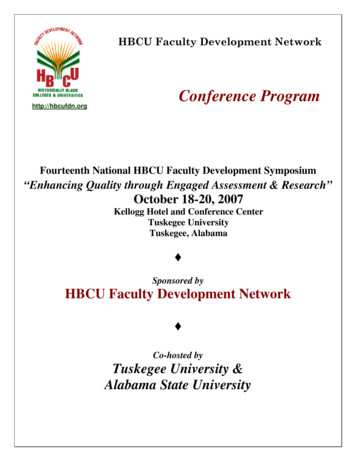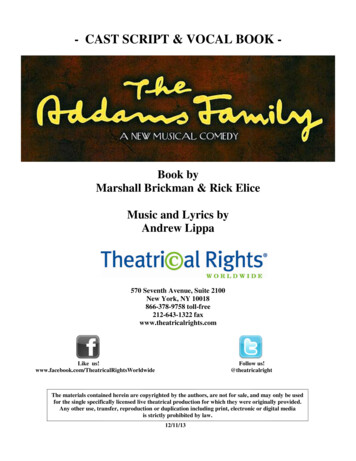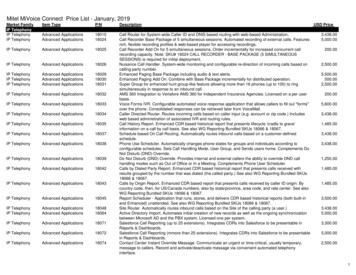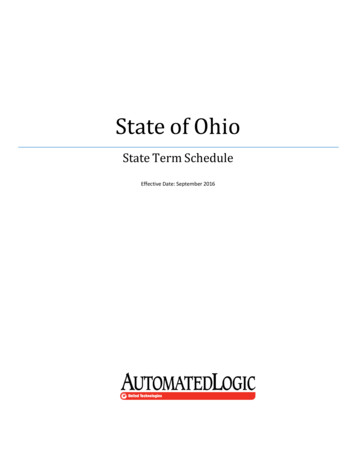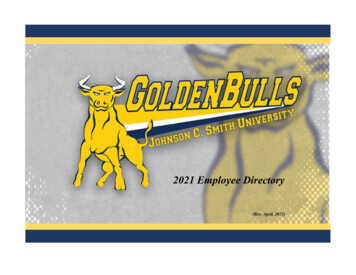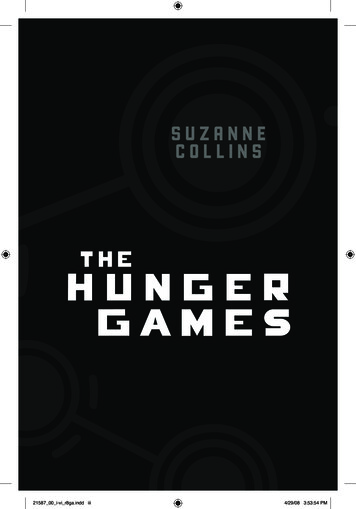
Transcription
SUZANNECOLLINS21587 00 i-vi r8ga.indd iii4/29/08 3:53:54 PM
1When I wake up, the other side of the bed is cold. Myfingers stretch out, seeking Prim’s warmth but finding onlythe rough canvas cover of the mattress. She must have hadbad dreams and climbed in with our mother. Of course, shedid. This is the day of the reaping.I prop myself up on one elbow. There’s enough light inthe bedroom to see them. My little sister, Prim, curled upon her side, cocooned in my mother’s body, their cheekspressed together. In sleep, my mother looks younger, stillworn but not so beaten-down. Prim’s face is as fresh as araindrop, as lovely as the primrose for which she was named.My mother was very beautiful once, too. Or so they tell me.Sitting at Prim’s knees, guarding her, is the world’s ugliest cat. Mashed-in nose, half of one ear missing, eyes thecolor of rotting squash. Prim named him Buttercup, insisting that his muddy yellow coat matched the bright flower.He hates me. Or at least distrusts me. Even though it wasyears ago, I think he still remembers how I tried to drownhim in a bucket when Prim brought him home. Scrawnykitten, belly swollen with worms, crawling with fleas. Thelast thing I needed was another mouth to feed. But Primbegged so hard, cried even, I had to let him stay. It turnedout okay. My mother got rid of the vermin and he’s a born21587 01 1-378 r8mr.indd 334/29/08 3:54:26 PM
4mouser. Even catches the occasional rat. Sometimes, when Iclean a kill, I feed Buttercup the entrails. He has stoppedhissing at me.Entrails. No hissing. This is the closest we will evercome to love.I swing my legs off the bed and slide into my huntingboots. Supple leather that has molded to my feet. I pull ontrousers, a shirt, tuck my long dark braid up into a cap, andgrab my forage bag. On the table, under a wooden bowl toprotect it from hungry rats and cats alike, sits a perfect littlegoat cheese wrapped in basil leaves. Prim’s gift to me onreaping day. I put the cheese carefully in my pocket as I slipoutside.Our part of District 12, nicknamed the Seam, is usuallycrawling with coal miners heading out to the morning shiftat this hour. Men and women with hunched shoulders,swollen knuckles, many who have long since stopped tryingto scrub the coal dust out of their broken nails, the lines oftheir sunken faces. But today the black cinder streets areempty. Shutters on the squat gray houses are closed. Thereaping isn’t until two. May as well sleep in. If you can.Our house is almost at the edge of the Seam. I onlyhave to pass a few gates to reach the scruffy field called theMeadow. Separating the Meadow from the woods, in factenclosing all of District 12, is a high chain-link fence toppedwith barbed-wire loops. In theory, it’s supposed to be electrified twenty-four hours a day as a deterrent to the predators that live in the woods — packs of wild dogs, lonecougars, bears — that used to threaten our streets. But since21587 01 1-378 r8mr.indd 44/29/08 3:54:26 PM
we’re lucky to get two or three hours of electricity in theevenings, it’s usually safe to touch. Even so, I always take amoment to listen carefully for the hum that means the fenceis live. Right now, it’s silent as a stone. Concealed by aclump of bushes, I flatten out on my belly and slide under atwo-foot stretch that’s been loose for years. There are severalother weak spots in the fence, but this one is so close tohome I almost always enter the woods here.As soon as I’m in the trees, I retrieve a bow and sheathof arrows from a hollow log. Electrified or not, the fencehas been successful at keeping the flesh-eaters out of District12. Inside the woods they roam freely, and there are addedconcerns like venomous snakes, rabid animals, and no realpaths to follow. But there’s also food if you know how tofind it. My father knew and he taught me some before hewas blown to bits in a mine explosion. There was nothingeven to bury. I was eleven then. Five years later, I still wakeup screaming for him to run.Even though trespassing in the woods is illegal andpoaching carries the severest of penalties, more people wouldrisk it if they had weapons. But most are not bold enoughto venture out with just a knife. My bow is a rarity, craftedby my father along with a few others that I keep well hidden in the woods, carefully wrapped in waterproof covers.My father could have made good money selling them, but ifthe officials found out he would have been publicly executedfor inciting a rebellion. Most of the Peacekeepers turn ablind eye to the few of us who hunt because they’re as hungry for fresh meat as anybody is. In fact, they’re among our21587 01 1-378 r8mr.indd 554/29/08 3:54:27 PM
best customers. But the idea that someone might be armingthe Seam would never have been allowed.In the fall, a few brave souls sneak into the woods toharvest apples. But always in sight of the Meadow. Alwaysclose enough to run back to the safety of District 12 if trouble arises. “District Twelve. Where you can starve to deathin safety,” I mutter. Then I glance quickly over my shoulder. Even here, even in the middle of nowhere, you worrysomeone might overhear you.When I was younger, I scared my mother to death, thethings I would blurt out about District 12, about the peoplewho rule our country, Panem, from the far-off city calledthe Capitol. Eventually I understood this would only lead usto more trouble. So I learned to hold my tongue and to turnmy features into an indifferent mask so that no one couldever read my thoughts. Do my work quietly in school. Makeonly polite small talk in the public market. Discuss littlemore than trades in the Hob, which is the black marketwhere I make most of my money. Even at home, where I amless pleasant, I avoid discussing tricky topics. Like the reaping, or food shortages, or the Hunger Games. Prim mightbegin to repeat my words and then where would we be?In the woods waits the only person with whom I can bemyself. Gale. I can feel the muscles in my face relaxing, mypace quickening as I climb the hills to our place, a rockledge overlooking a valley. A thicket of berry bushes protectsit from unwanted eyes. The sight of him waiting there bringson a smile. Gale says I never smile except in the woods.621587 01 1-378 r8mr.indd 64/29/08 3:54:27 PM
“Hey, Catnip,” says Gale. My real name is Katniss, butwhen I first told him, I had barely whispered it. So hethought I’d said Catnip. Then when this crazy lynx startedfollowing me around the woods looking for handouts,it became his official nickname for me. I finally had to killthe lynx because he scared off game. I almost regretted itbecause he wasn’t bad company. But I got a decent price forhis pelt.“Look what I shot,” Gale holds up a loaf of bread withan arrow stuck in it, and I laugh. It’s real bakery bread, notthe flat, dense loaves we make from our grain rations. I takeit in my hands, pull out the arrow, and hold the puncturein the crust to my nose, inhaling the fragrance that makesmy mouth flood with saliva. Fine bread like this is for special occasions.“Mm, still warm,” I say. He must have been at thebakery at the crack of dawn to trade for it. “What did itcost you?”“Just a squirrel. Think the old man was feeling sentimental this morning,” says Gale. “Even wished me luck.”“Well, we all feel a little closer today, don’t we?” I say,not even bothering to roll my eyes. “Prim left us a cheese.” Ipull it out.His expression brightens at the treat. “Thank you, Prim.We’ll have a real feast.” Suddenly he falls into a Capitolaccent as he mimics Effie Trinket, the maniacally upbeatwoman who arrives once a year to read out the names at thereaping. “I almost forgot! Happy Hunger Games!” He plucks721587 01 1-378 r8mr.indd 74/29/08 3:54:27 PM
8a few blackberries from the bushes around us. “And may theodds —” He tosses a berry in a high arc toward me.I catch it in my mouth and break the delicate skin withmy teeth. The sweet tartness explodes across my tongue.“— be ever in your favor!” I finish with equal verve. Wehave to joke about it because the alternative is to be scaredout of your wits. Besides, the Capitol accent is so affected,almost anything sounds funny in it.I watch as Gale pulls out his knife and slices the bread.He could be my brother. Straight black hair, olive skin, weeven have the same gray eyes. But we’re not related, at leastnot closely. Most of the families who work the mines resemble one another this way.That’s why my mother and Prim, with their light hairand blue eyes, always look out of place. They are. Mymother’s parents were part of the small merchant class thatcaters to officials, Peacekeepers, and the occasional Seamcustomer. They ran an apothecary shop in the nicer part ofDistrict 12. Since almost no one can afford doctors, apothecaries are our healers. My father got to know my motherbecause on his hunts he would sometimes collect medicinalherbs and sell them to her shop to be brewed into remedies.She must have really loved him to leave her home forthe Seam. I try to remember that when all I can see is thewoman who sat by, blank and unreachable, while her children turned to skin and bones. I try to forgive her for myfather’s sake. But to be honest, I’m not the forgiving type.Gale spreads the bread slices with the soft goat cheese,carefully placing a basil leaf on each while I strip the bushes21587 01 1-378 r8mr.indd 84/29/08 3:54:27 PM
of their berries. We settle back in a nook in the rocks. Fromthis place, we are invisible but have a clear view of the valley, which is teeming with summer life, greens to gather,roots to dig, fish iridescent in the sunlight. The day is glorious, with a blue sky and soft breeze. The food’s wonderful,with the cheese seeping into the warm bread and the berriesbursting in our mouths. Everything would be perfect if thisreally was a holiday, if all the day off meant was roamingthe mountains with Gale, hunting for tonight’s supper. Butinstead we have to be standing in the square at two o’clockwaiting for the names to be called out.“We could do it, you know,” Gale says quietly.“What?” I ask.“Leave the district. Run off. Live in the woods. You andI, we could make it,” says Gale.I don’t know how to respond. The idea is sopreposterous.“If we didn’t have so many kids,” he adds quickly.They’re not our kids, of course. But they might as wellbe. Gale’s two little brothers and a sister. Prim. And youmay as well throw in our mothers, too, because how wouldthey live without us? Who would fill those mouths that arealways asking for more? With both of us hunting daily,there are still nights when game has to be swapped for lardor shoelaces or wool, still nights when we go to bed withour stomachs growling.“I never want to have kids,” I say.“I might. If I didn’t live here,” says Gale.“But you do,” I say, irritated.21587 01 1-378 r8mr.indd 994/29/08 3:54:28 PM
“Forget it,” he snaps back.The conversation feels all wrong. Leave? How could Ileave Prim, who is the only person in the world I’m certainI love? And Gale is devoted to his family. We can’t leave, sowhy bother talking about it? And even if we did . . . even ifwe did . . . where did this stuff about having kids comefrom? There’s never been anything romantic between Galeand me. When we met, I was a skinny twelve-year-old, andalthough he was only two years older, he already lookedlike a man. It took a long time for us to even becomefriends, to stop haggling over every trade and begin helpingeach other out.Besides, if he wants kids, Gale won’t have any troublefinding a wife. He’s good-looking, he’s strong enough tohandle the work in the mines, and he can hunt. You cantell by the way the girls whisper about him when he walksby in school that they want him. It makes me jealous butnot for the reason people would think. Good hunting partners are hard to find.“What do you want to do?” I ask. We can hunt, fish, orgather.“Let’s fish at the lake. We can leave our poles and gatherin the woods. Get something nice for tonight,” he says.Tonight. After the reaping, everyone is supposed to celebrate. And a lot of people do, out of relief that their children have been spared for another year. But at least twofamilies will pull their shutters, lock their doors, and try tofigure out how they will survive the painful weeks to come.1021587 01 1-378 r8mr.indd 104/29/08 3:54:28 PM
We make out well. The predators ignore us on a daywhen easier, tastier prey abounds. By late morning, we havea dozen fish, a bag of greens and, best of all, a gallon ofstrawberries. I found the patch a few years ago, but Galehad the idea to string mesh nets around it to keep outthe animals.On the way home, we swing by the Hob, the black market that operates in an abandoned warehouse that once heldcoal. When they came up with a more efficient system thattransported the coal directly from the mines to the trains,the Hob gradually took over the space. Most businesses areclosed by this time on reaping day, but the black market’sstill fairly busy. We easily trade six of the fish for goodbread, the other two for salt. Greasy Sae, the bony oldwoman who sells bowls of hot soup from a large kettle,takes half the greens off our hands in exchange for a coupleof chunks of paraffin. We might do a tad better elsewhere,but we make an effort to keep on good terms with GreasySae. She’s the only one who can consistently be counted onto buy wild dog. We don’t hunt them on purpose, but ifyou’re attacked and you take out a dog or two, well, meat ismeat. “Once it’s in the soup, I’ll call it beef,” Greasy Saesays with a wink. No one in the Seam would turn up theirnose at a good leg of wild dog, but the Peacekeepers whocome to the Hob can afford to be a little choosier.When we finish our business at the market, we go tothe back door of the mayor’s house to sell half the strawberries, knowing he has a particular fondness for them and can1121587 01 1-378 r8mr.indd 114/29/08 3:54:28 PM
12afford our price. The mayor’s daughter, Madge, opens thedoor. She’s in my year at school. Being the mayor’s daughter, you’d expect her to be a snob, but she’s all right. Shejust keeps to herself. Like me. Since neither of us really hasa group of friends, we seem to end up together a lot atschool. Eating lunch, sitting next to each other at assemblies, partnering for sports activities. We rarely talk, whichsuits us both just fine.Today her drab school outfit has been replaced by anexpensive white dress, and her blonde hair is done up with apink ribbon. Reaping clothes.“Pretty dress,” says Gale.Madge shoots him a look, trying to see if it’s a genuinecompliment or if he’s just being ironic. It is a pretty dress,but she would never be wearing it ordinarily. She presses herlips together and then smiles. “Well, if I end up going tothe Capitol, I want to look nice, don’t I?”Now it’s Gale’s turn to be confused. Does she mean it?Or is she messing with him? I’m guessing the second.“You won’t be going to the Capitol,” says Gale coolly.His eyes land on a small, circular pin that adorns her dress.Real gold. Beautifully crafted. It could keep a family inbread for months. “What can you have? Five entries? I hadsix when I was just twelve years old.”“That’s not her fault,” I say.“No, it’s no one’s fault. Just the way it is,” says Gale.Madge’s face has become closed off. She puts the moneyfor the berries in my hand. “Good luck, Katniss.”“You, too,” I say, and the door closes.21587 01 1-378 r8mr.indd 124/29/08 3:54:29 PM
We walk toward the Seam in silence. I don’t like thatGale took a dig at Madge, but he’s right, of course. Thereaping system is unfair, with the poor getting the worst ofit. You become eligible for the reaping the day you turntwelve. That year, your name is entered once. At thirteen,twice. And so on and so on until you reach the age of eighteen, the final year of eligibility, when your name goes intothe pool seven times. That’s true for every citizen in alltwelve districts in the entire country of Panem.But here’s the catch. Say you are poor and starving aswe were. You can opt to add your name more times inexchange for tesserae. Each tessera is worth a meager year’ssupply of grain and oil for one person. You may do this foreach of your family members as well. So, at the age oftwelve, I had my name entered four times. Once, because Ihad to, and three times for tesserae for grain and oil formyself, Prim, and my mother. In fact, every year I haveneeded to do this. And the entries are cumulative. So now,at the age of sixteen, my name will be in the reaping twentytimes. Gale, who is eighteen and has been either helping orsingle-handedly feeding a family of five for seven years, willhave his name in forty-two times.You can see why someone like Madge, who has neverbeen at risk of needing a tessera, can set him off. The chanceof her name being drawn is very slim compared to those ofus who live in the Seam. Not impossible, but slim. Andeven though the rules were set up by the Capitol, not thedistricts, certainly not Madge’s family, it’s hard not to resentthose who don’t have to sign up for tesserae.21587 01 1-378 r8mr.indd 13134/29/08 3:54:29 PM
Gale knows his anger at Madge is misdirected. On otherdays, deep in the woods, I’ve listened to him rant about howthe tesserae are just another tool to cause misery in our district. A way to plant hatred between the starving workersof the Seam and those who can generally count on supperand thereby ensure we will never trust one another. “It’sto the Capitol’s advantage to have us divided among ourselves,” he might say if there were no ears to hear but mine.If it wasn’t reaping day. If a girl with a gold pin and notesserae had not made what I’m sure she thought was aharmless comment.As we walk, I glance over at Gale’s face, still smolderingunderneath his stony expression. His rages seem pointless tome, although I never say so. It’s not that I don’t agree withhim. I do. But what good is yelling about the Capitol in themiddle of the woods? It doesn’t change anything. It doesn’tmake things fair. It doesn’t fill our stomachs. In fact, itscares off the nearby game. I let him yell though. Better hedoes it in the woods than in the district.Gale and I divide our spoils, leaving two fish, a coupleof loaves of good bread, greens, a quart of strawberries, salt,paraffin, and a bit of money for each.“See you in the square,” I say.“Wear something pretty,” he says flatly.At home, I find my mother and sister are ready to go.My mother wears a fine dress from her apothecary days.Prim is in my first reaping outfit, a skirt and ruffled blouse.It’s a bit big on her, but my mother has made it stay with1421587 01 1-378 r8mr.indd 144/29/08 3:54:29 PM
pins. Even so, she’s having trouble keeping the blouse tuckedin at the back.A tub of warm water waits for me. I scrub off the dirtand sweat from the woods and even wash my hair. To mysurprise, my mother has laid out one of her own lovelydresses for me. A soft blue thing with matching shoes.“Are you sure?” I ask. I’m trying to get past rejectingoffers of help from her. For a while, I was so angry, Iwouldn’t allow her to do anything for me. And this is something special. Her clothes from her past are very preciousto her.“Of course. Let’s put your hair up, too,” she says. I lether towel-dry it and braid it up on my head. I can hardlyrecognize myself in the cracked mirror that leans againstthe wall.“You look beautiful,” says Prim in a hushed voice.“And nothing like myself,” I say. I hug her, because Iknow these next few hours will be terrible for her. Her firstreaping. She’s about as safe as you can get, since she’s onlyentered once. I wouldn’t let her take out any tesserae. Butshe’s worried about me. That the unthinkable mighthappen.I protect Prim in every way I can, but I’m powerlessagainst the reaping. The anguish I always feel when she’s inpain wells up in my chest and threatens to register on myface. I notice her blouse has pulled out of her skirt in theback again and force myself to stay calm. “Tuck your tailin, little duck,” I say, smoothing the blouse back in place.1521587 01 1-378 r8mr.indd 154/29/08 3:54:29 PM
Prim giggles and gives me a small “Quack.”“Quack yourself,” I say with a light laugh. The kindonly Prim can draw out of me. “Come on, let’s eat,” I sayand plant a quick kiss on the top of her head.The fish and greens are already cooking in a stew, butthat will be for supper. We decide to save the strawberriesand bakery bread for this evening’s meal, to make it specialwe say. Instead we drink milk from Prim’s goat, Lady, andeat the rough bread made from the tessera grain, althoughno one has much appetite anyway.At one o’clock, we head for the square. Attendance ismandatory unless you are on death’s door. This evening,officials will come around and check to see if this is thecase. If not, you’ll be imprisoned.It’s too bad, really, that they hold the reaping in thesquare — one of the few places in District 12 that can bepleasant. The square’s surrounded by shops, and on publicmarket days, especially if there’s good weather, it has a holiday feel to it. But today, despite the bright banners hangingon the buildings, there’s an air of grimness. The cameracrews, perched like buzzards on rooftops, only add to theeffect.People file in silently and sign in. The reaping is a goodopportunity for the Capitol to keep tabs on the populationas well. Twelve- through eighteen-year-olds are herded intoroped areas marked off by ages, the oldest in the front, theyoung ones, like Prim, toward the back. Family membersline up around the perimeter, holding tightly to one another’s1621587 01 1-378 r8mr.indd 164/29/08 3:54:30 PM
hands. But there are others, too, who have no one they loveat stake, or who no longer care, who slip among the crowd,taking bets on the two kids whose names will be drawn.Odds are given on their ages, whether they’re Seam or merchant, if they will break down and weep. Most refuse dealing with the racketeers but carefully, carefully. These samepeople tend to be informers, and who hasn’t broken the law?I could be shot on a daily basis for hunting, but the appetites of those in charge protect me. Not everyone can claimthe same.Anyway, Gale and I agree that if we have to choosebetween dying of hunger and a bullet in the head, the bullet would be much quicker.The space gets tighter, more claustrophobic as peoplearrive. The square’s quite large, but not enough to holdDistrict 12’s population of about eight thousand. Latecomersare directed to the adjacent streets, where they can watchthe event on screens as it’s televised live by the state.I find myself standing in a clump of sixteens from theSeam. We all exchange terse nods then focus our attentionon the temporary stage that is set up before the JusticeBuilding. It holds three chairs, a podium, and two largeglass balls, one for the boys and one for the girls. I stare atthe paper slips in the girls’ ball. Twenty of them haveKatniss Everdeen written on them in careful handwriting.Two of the three chairs fill with Madge’s father, MayorUndersee, who’s a tall, balding man, and Effie Trinket,District 12’s escort, fresh from the Capitol with her scary1721587 01 1-378 r8mr.indd 174/29/08 3:54:30 PM
18white grin, pinkish hair, and spring green suit. Theymurmur to each other and then look with concern at theempty seat.Just as the town clock strikes two, the mayor steps up tothe podium and begins to read. It’s the same story everyyear. He tells of the history of Panem, the country that roseup out of the ashes of a place that was once called NorthAmerica. He lists the disasters, the droughts, the storms, thefires, the encroaching seas that swallowed up so much ofthe land, the brutal war for what little sustenance remained.The result was Panem, a shining Capitol ringed by thirteendistricts, which brought peace and prosperity to its citizens.Then came the Dark Days, the uprising of the districtsagainst the Capitol. Twelve were defeated, the thirteenthobliterated. The Treaty of Treason gave us the new laws toguarantee peace and, as our yearly reminder that the DarkDays must never be repeated, it gave us the Hunger Games.The rules of the Hunger Games are simple. In punishment for the uprising, each of the twelve districts must provide one girl and one boy, called tributes, to participate. Thetwenty-four tributes will be imprisoned in a vast outdoorarena that could hold anything from a burning desert toa frozen wasteland. Over a period of several weeks, thecompetitors must fight to the death. The last tribute standing wins.Taking the kids from our districts, forcing them to killone another while we watch — this is the Capitol’s way ofreminding us how totally we are at their mercy. How littlechance we would stand of surviving another rebellion.21587 01 1-378 r8mr.indd 184/29/08 3:54:30 PM
Whatever words they use, the real message is clear. “Lookhow we take your children and sacrifice them and there’snothing you can do. If you lift a finger, we will destroyevery last one of you. Just as we did in District Thirteen.”To make it humiliating as well as torturous, the Capitolrequires us to treat the Hunger Games as a festivity, a sporting event pitting every district against the others. The lasttribute alive receives a life of ease back home, and their district will be showered with prizes, largely consisting of food.All year, the Capitol will show the winning district gifts ofgrain and oil and even delicacies like sugar while the restof us battle starvation.“It is both a time for repentance and a time for thanks,”intones the mayor.Then he reads the list of past District 12 victors. Inseventy-four years, we have had exactly two. Only one isstill alive. Haymitch Abernathy, a paunchy, middle-agedman, who at this moment appears hollering somethingunintelligible, staggers onto the stage, and falls into thethird chair. He’s drunk. Very. The crowd responds with itstoken applause, but he’s confused and tries to give EffieTrinket a big hug, which she barely manages to fend off.The mayor looks distressed. Since all of this is beingtelevised, right now District 12 is the laughingstock ofPanem, and he knows it. He quickly tries to pull the attention back to the reaping by introducing Effie Trinket.Bright and bubbly as ever, Effie Trinket trots to thepodium and gives her signature, “Happy Hunger Games!And may the odds be ever in your favor!” Her pink hair21587 01 1-378 r8mr.indd 19194/29/08 3:54:31 PM
must be a wig because her curls have shifted slightly offcenter since her encounter with Haymitch. She goes on a bitabout what an honor it is to be here, although everyoneknows she’s just aching to get bumped up to a better district where they have proper victors, not drunks who molestyou in front of the entire nation.Through the crowd, I spot Gale looking back at mewith a ghost of a smile. As reapings go, this one at least hasa slight entertainment factor. But suddenly I am thinking ofGale and his forty-two names in that big glass ball and howthe odds are not in his favor. Not compared to a lot of theboys. And maybe he’s thinking the same thing about mebecause his face darkens and he turns away. “But there arestill thousands of slips,” I wish I could whisper to him.It’s time for the drawing. Effie Trinket says as shealways does, “Ladies first!” and crosses to the glass ball withthe girls’ names. She reaches in, digs her hand deep into theball, and pulls out a slip of paper. The crowd draws in acollective breath and then you can hear a pin drop, and I’mfeeling nauseous and so desperately hoping that it’s not me,that it’s not me, that it’s not me.Effie Trinket crosses back to the podium, smoothes theslip of paper, and reads out the name in a clear voice. Andit’s not me.It’s Primrose Everdeen.2021587 01 1-378 r8mr.indd 204/29/08 3:54:31 PM
Happy Hunger Games!" He plucks 221587_01_1-378_r8mr.indd 71587_01_1-378_r8mr.indd 7 44/29/08 3:54:27 PM/29/08 3:54:27 PM. 8 a few blackberries from the bushes around us. "And may the odds —" He tosses a berry in a high arc toward me. I catch it in my mouth and break the delicate skin with

